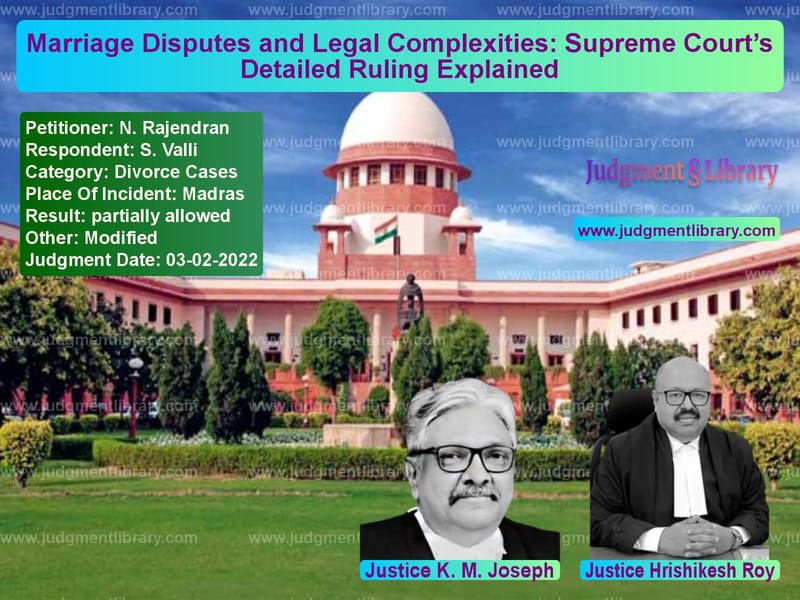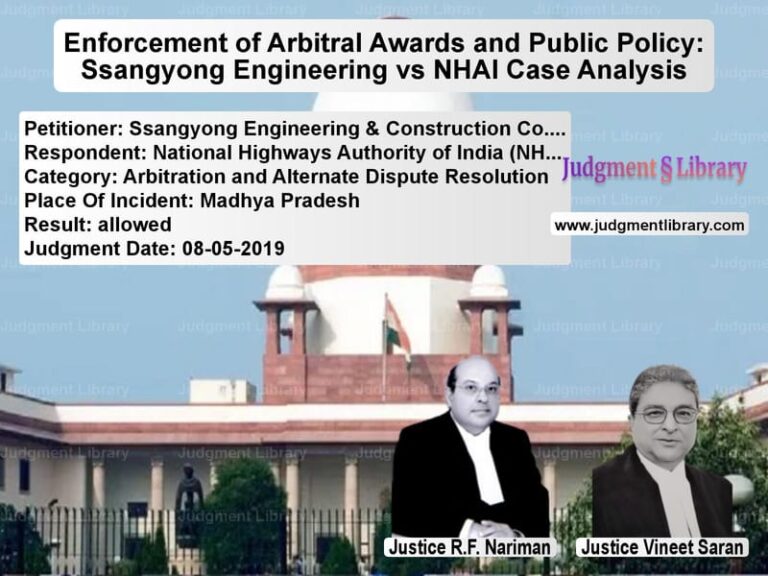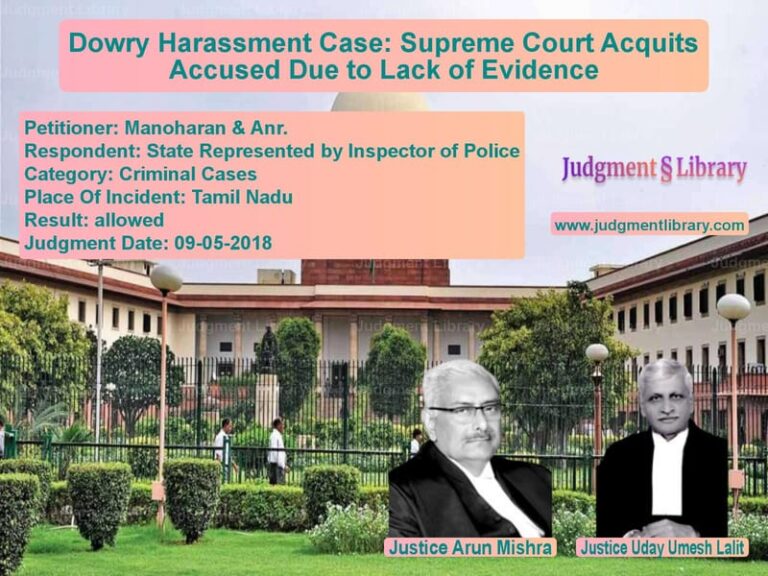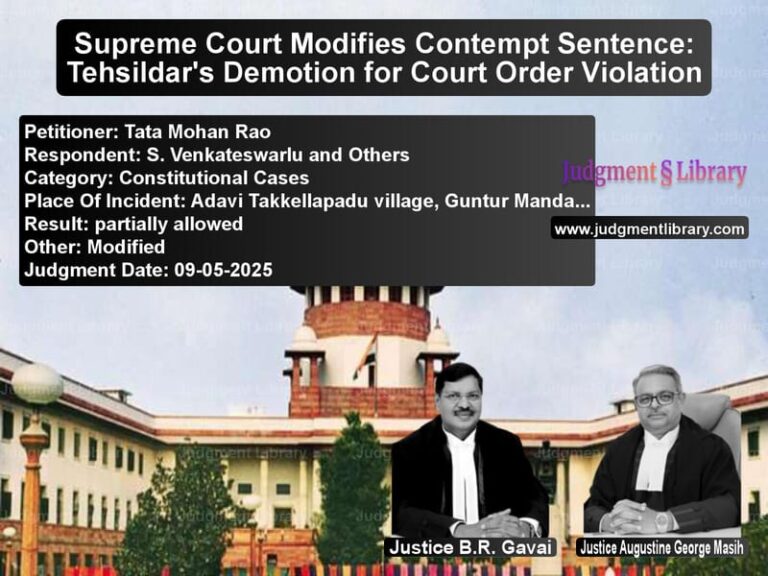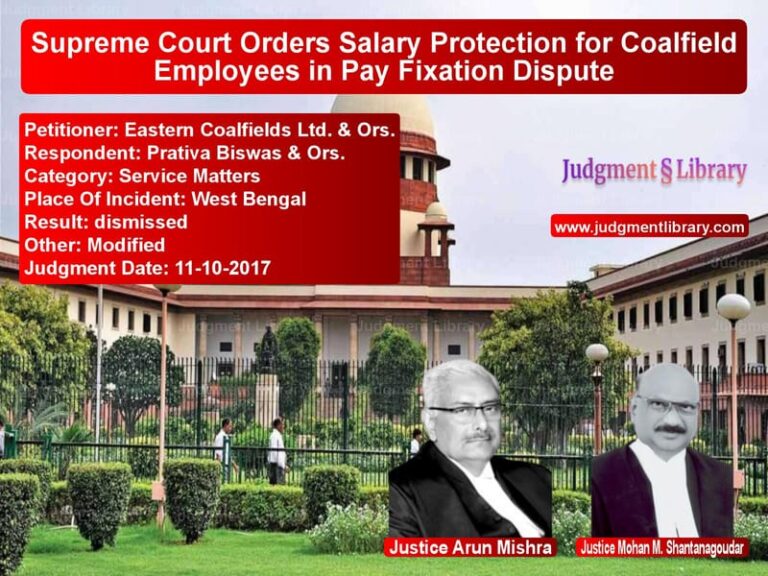Marriage Disputes and Legal Complexities: Supreme Court’s Detailed Ruling Explained
The Supreme Court of India recently delivered a significant judgment in the case of N. Rajendran vs. S. Valli, addressing issues of cruelty in marriage, legal timelines for appeals, and the interpretation of Section 15 of the Hindu Marriage Act regarding remarriage. This case sheds light on the complexities of matrimonial disputes and how the judiciary balances legal provisions with equitable justice.
Background of the Case
The case involves the marital dispute between N. Rajendran (the appellant) and S. Valli (the respondent). The two were married on August 29, 1999, according to Hindu rites. However, their marriage was troubled from the beginning. The appellant alleged that the respondent left the matrimonial home on January 18, 2000, and never returned, leading him to file for divorce on March 5, 2001, under Section 13(1)(ia) of the Hindu Marriage Act, 1955, citing cruelty.
The Family Court ruled in favor of the appellant and granted a divorce on July 23, 2004. However, the respondent challenged this decision before the Madras High Court on September 9, 2004. The High Court overturned the Family Court’s ruling, reinstating the marriage. This led to the appellant approaching the Supreme Court, arguing that the High Court erred in its findings.
Petitioner’s (Appellant’s) Arguments
- The appellant argued that the respondent exhibited cruel behavior, including threats of suicide and a refusal to return to the matrimonial home despite multiple requests.
- The appellant claimed that the strained relationship between his sister and the respondent’s brother significantly affected their marriage.
- He contended that the respondent voluntarily left the matrimonial home and showed no genuine interest in returning.
- The appellant further stated that he had remarried on October 31, 2004, believing that the appeal period had expired.
- He asserted that the appeal filed by the respondent was time-barred and that the Limitation Act, particularly Section 29(3), did not permit an extension.
- Additionally, he argued that the High Court failed to consider that over two decades had passed since their separation, rendering their marriage a legal fiction.
Respondent’s Arguments
- The respondent, through her counsel, contended that she left the matrimonial home due to pregnancy complications and was unable to return immediately.
- She emphasized that she had no intention of deserting the appellant and that her absence was due to unavoidable circumstances, including the death of her father.
- She argued that she had always been willing to continue the marriage and had even filed a petition for restitution of conjugal rights.
- The respondent claimed that the appellant’s allegations of cruelty were unsubstantiated and insufficient to justify the dissolution of marriage.
- She pointed out that the appeal was filed within the prescribed time when considering the period required to obtain a certified copy of the judgment.
- The respondent contended that the appellant’s remarriage violated Section 15 of the Hindu Marriage Act, as the appeal had been filed before the dissolution decree became final.
Supreme Court’s Analysis and Judgment
After carefully considering the arguments from both sides, the Supreme Court upheld the High Court’s decision, ruling that there was no conclusive evidence of cruelty to justify the divorce.
Key Observations of the Supreme Court:
- Marital discord, particularly arising from disputes between extended family members, does not constitute cruelty under the law.
- The respondent’s temporary absence due to pregnancy complications and bereavement was reasonable and not an act of desertion.
- The appeal filed by the respondent was within the permissible time limit when factoring in the time required for obtaining a certified copy of the judgment.
- The appellant’s remarriage before the disposal of the appeal contravened Section 15 of the Hindu Marriage Act.
- The marriage had irretrievably broken down due to prolonged separation of over 22 years.
Invoking Article 142: Dissolution on the Ground of Irretrievable Breakdown
While affirming the High Court’s ruling, the Supreme Court exercised its extraordinary jurisdiction under Article 142 of the Constitution to dissolve the marriage, considering:
- The couple had lived apart for more than 22 years, making reconciliation impossible.
- The appellant had remarried and had a child from the second marriage.
- Any legal insistence on continuing the marriage would serve no meaningful purpose.
- The respondent’s rights were secured through a financial settlement.
Final Decision and Financial Settlement
The Supreme Court ruled that the marriage should be dissolved but mandated a financial settlement in favor of the respondent. The appellant was ordered to pay a sum of Rs. 20 lakhs to the respondent as a one-time settlement, ensuring her financial security.
Additionally, the Court clarified that the respondent’s son from the marriage retained his legal rights concerning inheritance and property claims.
Conclusion: Legal Implications of the Judgment
This judgment highlights several critical legal principles:
- The necessity of proving cruelty beyond general marital discord to justify divorce.
- The importance of adhering to legal timelines for filing appeals in matrimonial cases.
- The implications of Section 15 of the Hindu Marriage Act in preventing remarriage before the conclusion of appellate proceedings.
- The Supreme Court’s discretionary power under Article 142 to grant relief in exceptional circumstances.
This ruling serves as a landmark case demonstrating the balance between procedural legality and equitable justice in matrimonial disputes. It underscores that while legal principles must be upheld, the Court retains the power to provide relief in cases where continued marriage serves no purpose.
Petitioner Name: N. Rajendran.Respondent Name: S. Valli.Judgment By: Justice K. M. Joseph, Justice Hrishikesh Roy.Place Of Incident: Madras.Judgment Date: 03-02-2022.
Don’t miss out on the full details! Download the complete judgment in PDF format below and gain valuable insights instantly!
Download Judgment: n.-rajendran-vs-s.-valli-supreme-court-of-india-judgment-dated-03-02-2022.pdf
Directly Download Judgment: Directly download this Judgment
See all petitions in Alimony and Maintenance
See all petitions in Child Custody
See all petitions in Divorce by Desertion
See all petitions in Mutual Consent Divorce
See all petitions in Property Division in Divorce Cases
See all petitions in Judgment by K.M. Joseph
See all petitions in Judgment by Hrishikesh Roy
See all petitions in partially allowed
See all petitions in Modified
See all petitions in supreme court of India judgments February 2022
See all petitions in 2022 judgments
See all posts in Divorce Cases Category
See all allowed petitions in Divorce Cases Category
See all Dismissed petitions in Divorce Cases Category
See all partially allowed petitions in Divorce Cases Category

